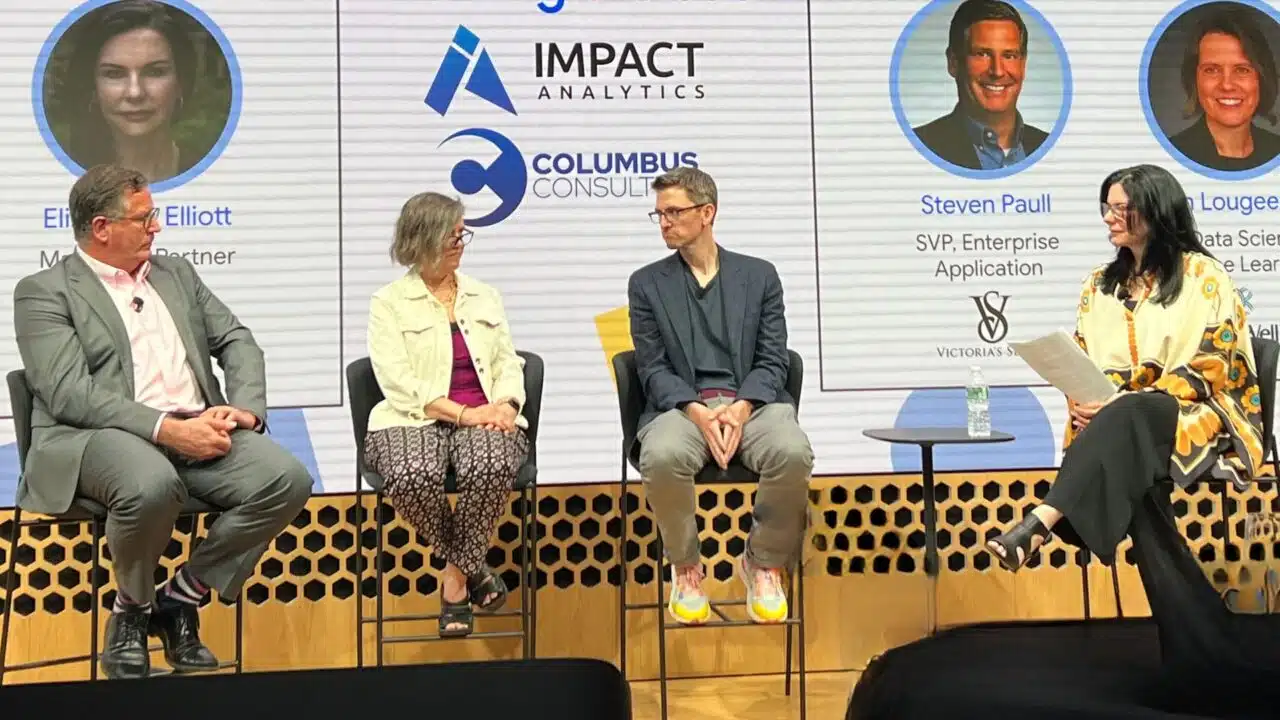HOW DATA AND ANALYTICS DISRUPTED THE MARKET AND TRANSFORMED THE INDUSTRY.
Post pandemic, the industry was anticipating the new normal which never came. While retailers were establishing scalable solutions for challenges that surfaced from supply chain to shelf, artificial intelligence was becoming more accessible to consumers. Fast forward a few years and what started as a new era quickly shifted to a mandate to do business differently-driven by the ever-evolving needs of the consumer. Retailers are now leveraging data and analytics more than ever to enhance experiences, optimize inventory and drive profit. So, what’s next? Columbus Consulting partnered with Google Cloud and Impact Analytics to explore today’s disruptive trends, define generative AI and explore real life applications for modern technology and learnings.


On May 14, 2024, Columbus Consulting, along with its partners, assembled industry leadership to meet at Google’s NYC offices for a morning summit to review and discuss how data, analytics and AI are impacting the consumer and how retailers are using technology to optimize performance. The day consisted of keynote presentations from Impact Analytics CEO, Prashant Agrawal and GoogleCloud Field CTO-Retail, Vish Ganapathy along with a series of retail panels and closing comments by Jon Beck, Columbus Consulting’s CEO.
The morning started with a review of the five current factors impacting “retail as usual.” Expectedly, inflation/rising interest rates and the broken supply chain emerged as two of the top factors. These conditions are further fueled by the current state of the consumer who are managing 40-year high inflation rates, nearly 30-year high interest rates and dealing with dwindling personal savings accounts and record debt levels. These financial factors are further complicated by the identification of three new factors, namely: more transient consumers via movement across the US, global warming implications and body sizing shifts from weight loss drugs.
Consumer mobility is at heightened levels with more people moving in the last 3 years than in the previous 50 years combined. This shift in the shopper base is complicating merchandising, inventory and allocation decisions. Retailers can no longer rely on prior year/season trends, they need to consider the market shifts from/to warm, cold states and generational/demographic movements. Similarly, global climate changes are creating significant weather disruptions. Increasing floods, record temperature highs and more significant storm destruction are not only alarming, but are impacting retailer predictions from design to delivery.
The final factor, the increasing use of weight loss drugs, may seem unrelated to retail, but analysts state that a 2% shift in the industry’s size curve reduces gross margin rates by 360 basis points. Changing body types impact the food industry/sales, lifestyle choices and wardrobe selections. All of which can amount to significant changes in business trends.
Given the already complex marketplace and speed of customer change/expectations, retailers are turning to technology to help them solve for the emerging lack of predictability to their businesses. Technology without clean data and without the ability to process big data, however, are merely initiatives and not solutions for more accurate, more real-time decision making. AI/ML have become more accessible over the last two years and have become a requirement to stay competitive. According to Google’s Vish Ganapathy, the progression of leveraging data comes down to:
- Statistical Modeling: creating logical assumptions based on a set of probabilities and a conditional framework
- Machine Learning Application: processing existing and historical data for evolved learnings without the need to change programming structure
- Artificial Intelligence Generation: scalable data absorption and processing at granular levels using complex and predictive variables with the capability to provide forward-looking knowledge and generate new/non existing data/content
The progression from statistical modeling to AI has allowed for retailers to address the current factors impacting their businesses. Specifically, AI creates value for:
- Digital growth and experiences (conversational commerce)
- Marketing and customer outreach (content creation)
- Sustainable and efficient operations (customer services and back of office streamlining)
- Associate and store productivity (training and task management)
AI was once deemed more theoretical by those who could not understand its application. However, with the use of good data and insightful analytics, retailers today are applying technology to provide real life solutions to market complexity and unforeseeable variables all while creating greater efficiency, accuracy and speed. One immediate win for retailers is the use of AI to identify and solve for lost sales. Brands like Tapestry/Coach and Ralph Lauren are applying AI solutions to answer questions like “why are we losing sales in our top/evergreen products?” and “how can we never be out of stock without simply increasing inventory levels?” AI can review large scale data inputs and tailor solutions down to regional or even store/consumer levels with custom assortments, demand and capacity considerations and even predicting shared product allocations across channels.
But why is this only available now? Google experts clarified that while machine learning relied on historical data to predict and forecast, it had a technical deficit, namely, it could not generate new data to access patterns and identify risks. Artificial intelligence is trained to adapt and learn without human intervention (redoing data models). AI acts as a force multiplier to accelerate and amplify. Hence, the future is now and retailers need to get on board.
According to Columbus Consulting’s Managing Partner and Board Chair, Elizabeth Elliott, “we are seeing clear AI applications in end-to-end inventory management. AI is helping some of our clients define their best products (sellable +on-brand + profitable), while establishing the most efficient inventory levels considering both supply and demand and applying optimized allocation plans across fulfillment centers and sales channels.” Two cautions that Elliott speaks to about AI implementation is that retailers need to clearly define what they are asking AI to solve for before they start to leverage it and, they need to consider how to prepare their organization for change and adoption. She further summarized her hosted panel’s key themes into the true benefits of AI enabling: agility, responsiveness/predictiveness, visibility and resiliency. One area where panelists from Victoria’s Secret, Knitwell and Sundance spoke of greater opportunity for AI use is to bring the inventory conversation into the product lifecycle sooner at product creation than at the end at delivery. Reducing waste, driving higher full price sell-throughs and minimizing product transfers are all immediate cost benefits from early AI application.
Columbus Consulting’s CEO, Jon Beck summarized the day by saying, “the industry is at the end of manual,” meaning that retailers are at a crossroad to pivot from manual intervention with running their businesses to leveraging AI to deliver greater accuracy, insights, and profitability. Retailers have a choice today to either grow or decline. In order to grow, they need to be additive without layering on complexity and overhead and they need to find better means to de-risk their plans and execute their business. To do so AI/ML is an absolute requirement.
ABOUT COLUMBUS CONSULTING
Columbus Consulting delivers solutions that drive true value and have been transforming the retail and CPG industries for over two decades. We are a retail consulting company of industry experts. Our approach is simple, if you do it, we do it. We are more than consultants; we are experienced practitioners who actually sat in our clients’ seats. We understand the challenges, know what questions to ask and deliver the right solutions. Columbus offers a unique, consumer-centric approach with an end-to-end perspective that bridges functional & organization silos from strategy to execution. Our specialties include: unified commerce, merchandising & category management, planning & inventory management, sourcing & supply chain, data & analytics, accounting, finance & operations, people & organization and information technology. Let us know how we can help you. To learn more, visit COLUMBUSCONSULTING.COM.


